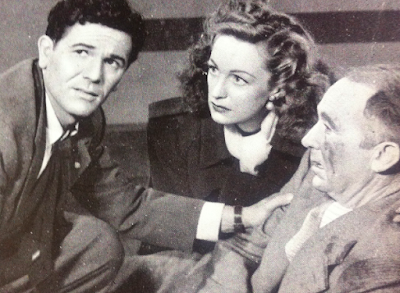 |
| John Garfield, Geraldine Fitzgerald and Walter Brennan in 'Nobody Lives Forever' (1946). |
In "Nobody Lives Forever" (1946), Blake is a wounded G.I. sent home to New York from the war. He keeps his arrival secret to surprise his girlfriend, Faye (Toni Blackburn), who's got a few surprises of her own for him — turns out she's been running around with a mustachioed nightclub owner and the two of them pocketed the cash Blake left with her.
We've seen the jilted returning soldier theme often in noir, but in this case Blake doesn't waste time fretting over his lady friend's double dealing. He's the jaded sort who takes disloyalty in stride and moves on.
He extracts his dough from the nightclub owner and he and his pal Al (George Tobias) hop over to the West Coast to connect with some old cronies. There's an attractive widow, Gladys Halvorsen (Geraldine Fitzgerald), with a large bankroll that the older guys want to fleece. But Blake is the only one in this tired crew who's still dashing enough to pull off the job. Misspent years have taken a toll on the more aged conmen and each has a tale of woe about the big one that got away.
Blake's pal Pops Gruber (the terrific Walter Brennan) is an elderly grifter who's reduced to stealing drunks' wallets. He sets up a curbside telescope and lets suckers watch the moon and the stars for a dime as he fishes through their pockets. Like everyone else in the racket he wants to score big and get out of it. But he sticks to penny-ante cons because he's hooked on the adrenaline rush it gives him. When he pursues a pack of chiseling kidnappers in his jalopy we see the thrill of the chase in his eyes. Running scams and living outside the law is the stuff that keeps his motor purring.
Reluctant to get involved with the widow at first, Blake finally pursues the monied lady and is able to put up a false facade that fools her and her business manager. Like many a grifter, he disarms his targets with charm, temporarily transforming himself into the person the dupe wants him to be. He convinces Gladys that he's an entrepreneur running a deep sea salvage operation and entices her to invest.
The trouble is, he falls for her and all bets are off. Instead of robbing the widow he wants wed her. It reminds us a bit of of Woody Allen's "Take the Money and Run," in which he finds love at first sight, and after 20 minutes gives up on the idea of stealing her handbag.
That doesn't sit right with Doc Ganson (George Coulouris), who dreamed up the widow scam and has been on the sidelines waiting for a slice of the lady's fortune. He thinks that Blake is faking his romantic attachment to the lady and he's not about to let him walk the widow down the aisle and take possession of her wealth.
As Blake, Garfield is his typically driven, anti-hero self. He's self-assured, romantically smitten and able to change course with little worry about the consequences. The question is, will the prospect of true love be the ingredient that makes him change his grifting ways. We never doubt that his feelings for Gladys are sincere, but it's worth mentioning that she's got two million smackers in the bank — that alone might be incentive for anyone to abandon a life of petty crime.
It's a bit hard to swallow that Gladys continues to have faith in Blake, even after she learns that he's not who he pretends to be. That's fine for Blake because he needs all the support he can get when others in the gang turn on him for scuttling their plans.
In the end, he and Pop Gruber go after Doc's gang, who have kidnapped Gladys and are holding her against her will. The tension is high as our outnumbered good guy go up against tall odds. This Garfield performance may not have the fiery eroticism of his pairing with Lana Turner in "The Postman Always Rings Twice," which premiered the same year, but it's a taut thriller with a touch of romance that maintains a satisfyingly brisk pace throughout.
The title, "Nobody Lives Forever," is Blake's wistful throwaway line uttered at the film's conclusion after he and his two cohorts have faced a punishing ordeal. His jaded outlook has melted away, and we can rest assured that for him, life will never be the same.
Based on a 1943 W.R. Burnett novel of the same title.

No comments:
Post a Comment